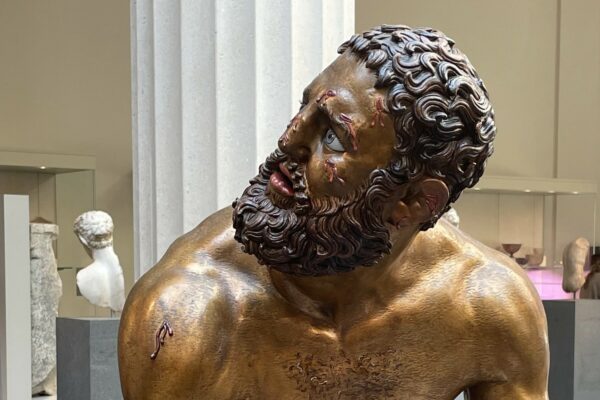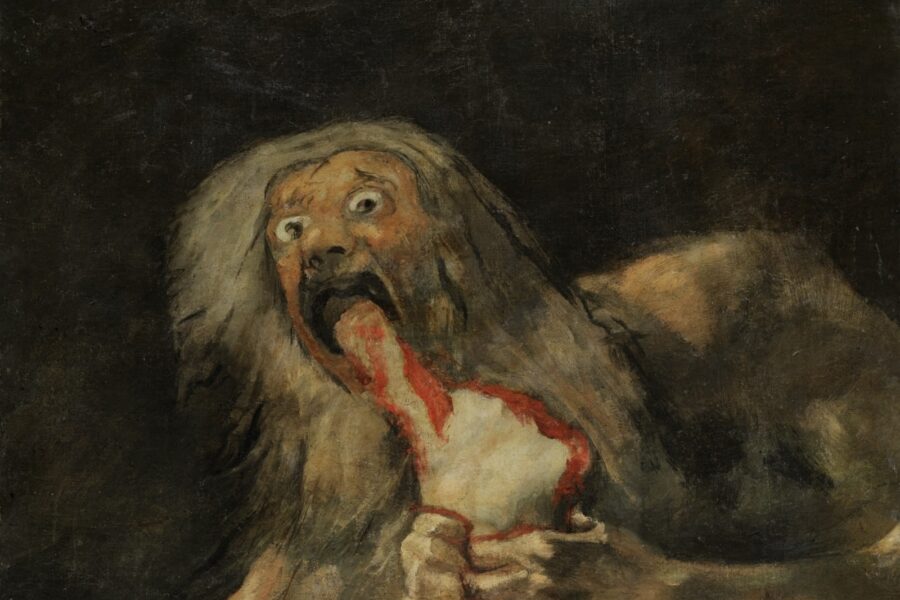
Me want children! Num, num, num, num!
Meeting 9: In which Homer and the Muses delve deep into Hesiod’s creation myths, and are rightfully concerned about what they find in there.
This episode of Mythology Pitch Meetings brought to you by CLAS-C 205 Classical Mythology.
Have you ever wondered how your favorite Classical Myths came to be? This is absolutely not how that happened, but it could have happened, maybe, and that’s the point of mythology. Shout-out to Ryan George, whose Pitch Meeting video series inspired the Muses.
CALLIOPE, MUSE OF EPIC POETRY: So you have a Classical Myth to pitch to me?
HOMER, UNCONTESTED G.O.A.T OF ANCIENT POETRY: Do I! Clio suggested I do a myth of about the creation of the universe.
CALLIOPE: I don’t know, that sounds pretty boring. Are people really going to care where a bunch of inanimate infrastructure came from?
CLIO, MUSE OF HISTORY (interrupting): Actually, cosmogony myths are going to be wildly popular. In fact, the one coming out of Judea will be a particular hit. We should really have something to compete with that, especially given our poor relative showing in the flood section. Turns out mortals love animal couples.
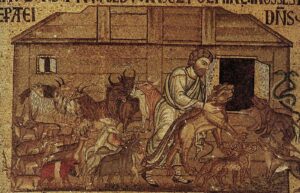
I spent five years getting my naval engineering degree for this?
CALLIOPE: Mortals are so weird. Fine, what have you got?
HOMER: Well, I actually didn’t have any ideas myself, but my buddy Hesiod had a whole pitch ready to go…
CALLIOPE: That misogynist loon?
HOMER: I know you told me you’d smite us both if you ever saw him again, so I thought I’d rework it and bring it in myself. He’s got an interesting set-up. In the beginning, the first things came from Chaos.
CALLIOPE: What’s “chaos?”
HOMER: Um, I have no idea. Maybe it’s a word Hesiod made up?
CLIO: Modern scholars will debate what exactly Hesiod meant by that, since he’ll be the earliest example of that word. They’ll eventually decide it means something like “vastness” or “nothingness.”
CALLIOPE: The first things came from nothingness? That doesn’t make any sense.
CLIO: (shrugs)
HOMER: (reading through scrolls) Um…this goes on for some time with various entities giving birth asexually…and then they start having children with their siblings…
CALLIOPE: What is wrong with Hesiod?
HOMER: I’ll just skip ahead to where the plot kicks in…monsters with 100 hands? I can’t even imagine what those look like.
CALLIOPE: I bet Hesiod can.
HOMER: Here we go. So Gaia, the Earth, and Uranus, the Sky…no wait, more incest and violence…
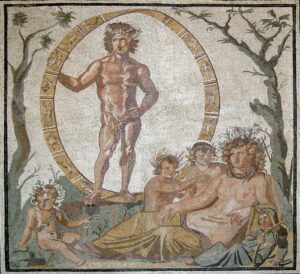
Uranus and Gaia’s family portrait hid a *lot* of weird.
CALLIOPE: Ok, clearly this is going to be the theme. Let’s just get on with it.
HOMER: Um, Gaia and Uranus are giving each other lots of special hugs. But Uranus gets annoyed that special hugs…conclude. Also, babies want to use the same hallway as an exit, and Uranus doesn’t like giving them the right of way. So he decides to…fully occupy that hallway. Permanently.
CALLIOPE: I am very confused but I would like to stay that way. Do NOT clarify.
HOMER: So now Gaia gets irritated, because she’s got a baby-backup inside her. So she turns to her children who have already used the exit, and asks them to help her get daddy off of mommy.
CALLIOPE: Wait, wouldn’t Uranus hear that, since he’s, um, nearby?
HOMER: He’s pretty distracted at the moment. Anyway, Cronus, the most powerful Titan, volunteers to help Gaia.
CALLIOPE: What’s a Titan, exactly?
HOMER: Um, I’m not sure. Hesiod doesn’t say, They’re some sort of god, apparently. Hesiod lists a bunch here, and then…sort of just trails off?
CALLIOPE: Whatever. He clearly lost interest and so have I. What’s next?
HOMER: Well, Gaia gives Cronus a sharp rock, because she’s got lots of those. And then at the next opportunity, Cronus uses the rock to…uh…make Uranus shorter.
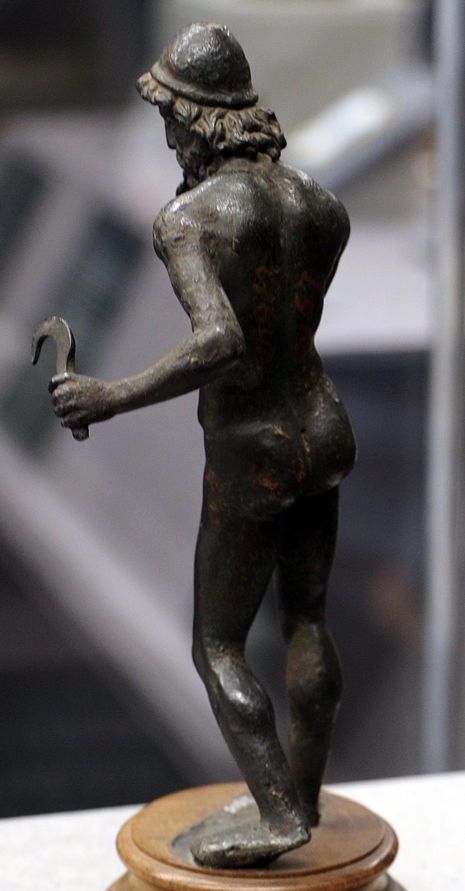
Whatever this is, it can’t end well.
CALLIOPE: He cuts off his head?
HOMER: No.
CALLIOPE: He cuts off his feet?
HOMER: No.
CALLIOPE: How else can you make a guy short…oh.
HOMER: Yes.
CALLIOPE: Wow, it is going to be really difficult for future generations to decipher Hesiod’s neuroses.
CLIO: Nope, it’s going to be super easy, barely an inconvenience. They’ll treat him as one of the greatest poets of all time and generally ignore what a wacko he was. Few will question why he’s the only source for some of the weirdest stories of Ancient Greece. The idea that he might have just creeped all of his contemporaries out with his emo poetry will not gain significant traction.
HOMER: So anyway, now Cronus is King of the Titans, and he is having kids with Rhea, his sister-wife-queen…
CALLIOPE: I’m sorry, are you sure you’re reading that right?
HOMER: Unfortunately, yes. But Cronus is worried, because he doesn’t want his kids to overthrow him like he overthrew his dad. So he arrives at the obvious solution of eating all his children the second they pop out of Rhea’s womb. Wait, did I read that right?
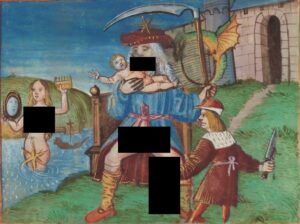
Oddly enough, the only part of this *not* consistent with the original Greek myth is the dragon.
CALLIOPE: Is Hesiod playing some sort of “perverse-family-relations Bingo”?
HOMER: If so, he is winning handily. Rhea gets angry, because Cronus is eating her offspring, so she goes to Gaia, who is super incensed that she has to deal with yet another issue in finally getting some grandkids to brag about. So she advises Rhea on a clever plan. The next time Rhea gives birth, she does so in hiding, and then nymphs spirit the baby Zeus away to Crete, which will develop a thing for being the nursery for weird infants. And when Cronus arrives, demanding a snack, Rhea gives him a rock wrapped in the placenta and umbilical cord, and he eats that, thinking it’s his newborn.
CALLIOPE: He doesn’t realize he’s eating a rock?
HOMER: I don’t know, I’ve never eaten a rock or a baby. Maybe they taste similar? So Zeus grows up, and when he’s grown, Rhea sneaks some sort of concoction into Cronus’ dinner, and he vomits up all of Zeus’ five siblings.
CALLIOPE: Who are the siblings?
HOMER: Hades, Poseidon, Hestia, Demeter, and Hera.
CALLIOPE: Wait, Hera, like Zeus’ future wife and…you know what, that tracks. Carry on.
HOMER: So they immediately fight the Titans, and win! And Zeus banishes the Titans to something called Tartarus, which may also be some word Hesiod made up.
CLIO: Later scholars will think it means a dark vastness!
CALLIOPE: Of course they will. How are Zeus’ siblings in any condition to fight when they are rescued? Weren’t they eaten?
HOMER: Well, they’re gods, so they couldn’t die, regardless of being eaten. I guess they just grew up and chilled in their dad’s stomach. And learned to fight in there, come to think of it. Like Athena will when she forms in Zeus’ head. I guess gods have preschools and military academies or something inside of them instead of internal organs. What do you think of this creation myth?
CALLIOPE: I think if Hesiod had more hugs when he was little, this whole thing could have been avoided. Clio, none of this could possibly catch on, right?
CLIO: Of course not. All of this story will remain obscure and not shown in a single visual source, at least up to the part about Zeus. The Greeks will put a stone called the omphalos in the Oracle’s Temple at Delphi, and say it’s the placenta-wrapped rock Cronos ate. Then they’ll call it the belly-button of the world and have Apollo sit on it.
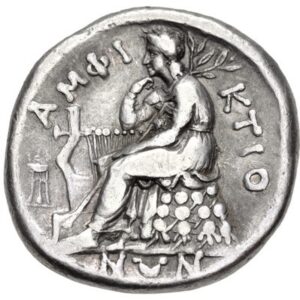
Apollo ponders what, exactly, it is that he is sitting on.
CALLIOPE: Yep, that tracks, too. Well, I don’t have a better idea for where the world comes from, and I still have a hard time believing cosmic infrastructure myth will prove to be a thing. So I’m going to let this nonsense go ahead. And then we are done with Hesiod, do you hear me?
CLIO: One thing, how are we going to adapt this story for children?
CALLIOPE: (laughing) I’m pretty sure no one would think to tell Greek myths to children! Even Hesiod would think that’s inappropriate.
Share on Twitter, or Instagram, or really wherever you want.
For more crazy stories about the beginning of the world, and how creation myths shaped Ancient Greek and modern societies, enroll in CLAS-C 205 Classical Mythology, coming up Spring 2023, and earn GEC credits while you’re at it! Can’t get enough of Ancient Greece and Rome? Earn a Classics Minor in just 15 credits!


